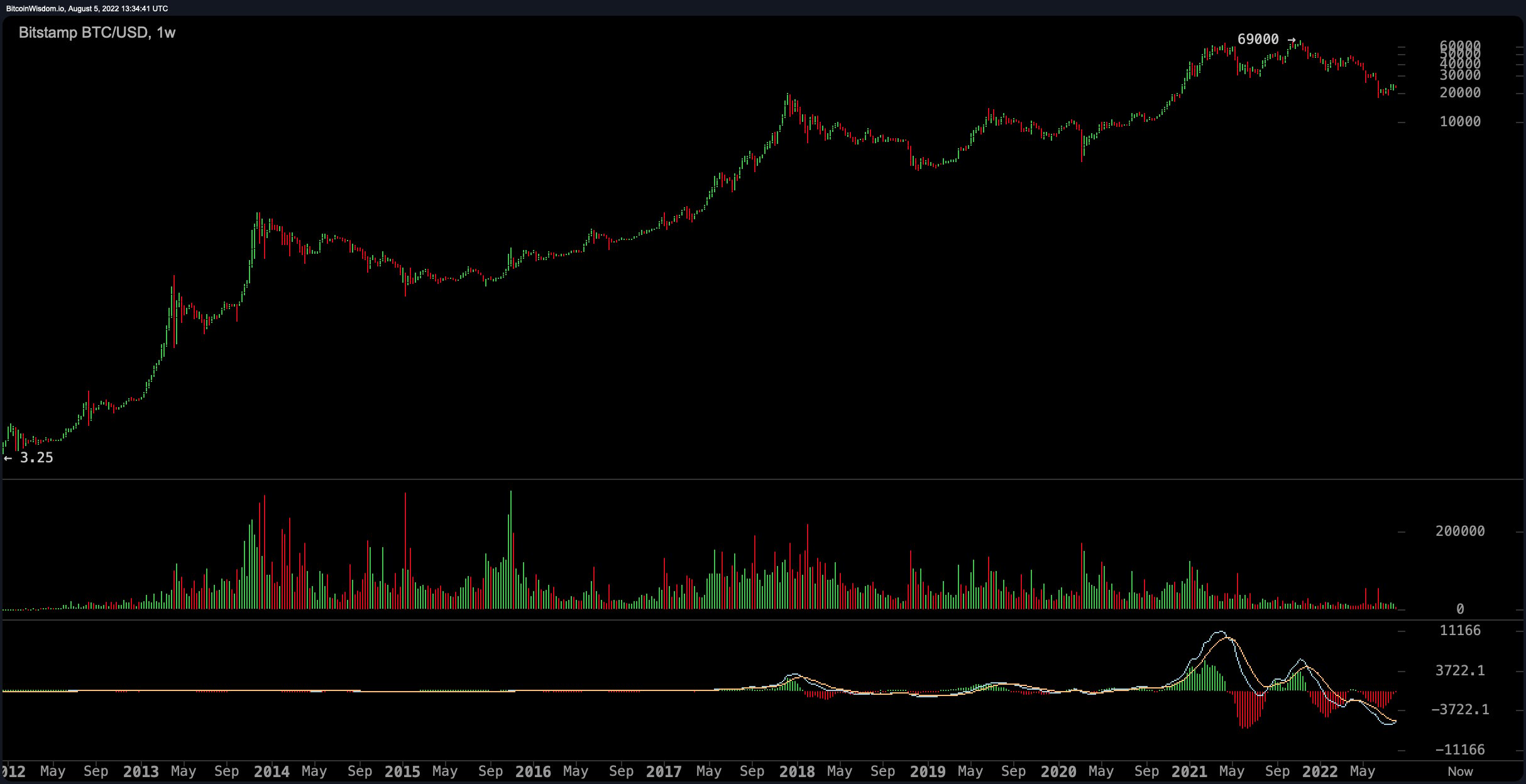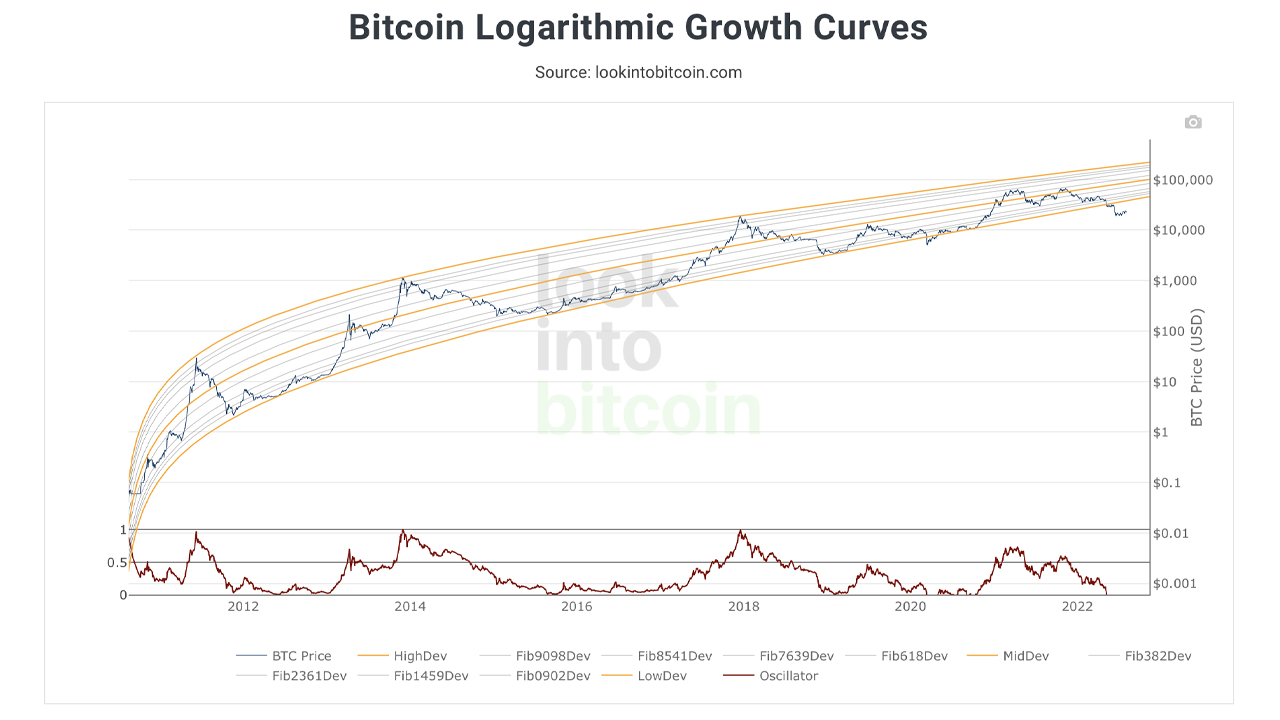The 2022 bear market has been brutal as more than $2 trillion in value has been wiped away from the crypto economy. In addition to record values lost, the crypto winter has managed to break a number of popular bitcoin price models like the rainbow price chart and Plan B’s infamous stock-to-flow model. Moreover, since May 11, 2022, the well known power-law corridor model or logarithmic growth curves chart has also broken, and it’s deviated below the lower band for roughly 86 days.
A Deviation From the Norm: 2022’s Bitcoin Bear Market Breaks Some of the Most Popular Price Models
For many years now, crypto traders have leveraged tools, charts, and models to predict the future value of bitcoin (BTC) and other popular digital assets. Bitcoin.com News has written about Plan B’s stock-to-flow (S2F) price model on many occasions and in 2021 the S2F model was fairly accurate up until the end of November.
Additionally, many bitcoiners count on other charts and price models like the golden ratio multiplier, the Fibonacci sequence, the rainbow model, and logarithmic growth curves. During the last quarter of 2021, bitcoin traders expected BTC to reach $100K per coin by the year’s end.

In September 2021, when BTC was swapping for prices between $45K and $50K, the lead insights analyst at Blockware Solutions, Will Clemente, tweeted about a new price model he called the “Illiquid Supply Floor.” At that time, Clemente said the model combined Glassnode’s illiquid supply data with Plan B’s S2F model and said it created a bitcoin floor price based on BTC’s real-time scarcity.
The floor value Clemente predicted was $39K and as time passed the analyst’s Illiquid Supply Floor model broke. Even after Plan B’s S2F “worst-case scenario” prediction deviated at the end of November, the pseudonymous analyst said he was confident that bitcoin’s price was still “on track towards $100K.”
None of these bold predictions came to fruition, and amid the start of the crypto bear market, these types of price models were openly mocked and denounced by many people in the crypto community. The Illiquid Supply Floor was not solid, S2F broke, and people made fun of the popular “Rainbow” price indicator.
The Popular Power-Law Corridor Model Has Logged an 86 Consecutive Day Break From the Norm
Furthermore, one of the most popular bitcoin price models, known as the power-law corridor model, or logarithmic growth curves chart, has also been broken since May 11, 2022. The chart is favored because BTC’s price timeline can be seen from a logarithmic perspective. In fact, a log price chart is one of the most popular in the world of crypto and traditional financial technical analysis.
Bitcoin logarithmic growth curves charts are hosted on crypto web portals such as lookintobitcoin.com and coinglass.com. The current deviation is unusual as BTC’s price has only dropped below the lower band two times in history prior to 2022. The first deviation was a quick occurrence in October 2010, and the second most noticeable deviation took place on March 11, 2020.

March 11, 2020, otherwise known as ‘Black Thursday,’ was an interesting day for every asset on planet earth as financial markets shuddered across the board. At that time, BTC broke beneath the $4K range, and the move sunk below the low dev line on the logarithmic growth curves chart.
This specific occurrence didn’t last very long as global markets rebounded from the initial Covid-19 scare, and a bull market took place almost immediately after. Bitcoin’s price skyrocketed to the $64K zone in April 2021, and above that range to $69K on November 10, 2021.
Nine months later, bitcoin’s (BTC) price is down 66% below the $69K all-time high, and the popular and often reliable logarithmic growth curves model has been broken for 86 consecutive days. While BTC has seen the first bear market rally, the price still has a ways to go to get back into the power-law corridor’s lower band.
In order for the price to do so now, the price needs to be just above the $35K range. The price of bitcoin has never breached below the low band line for so long, and it is unusual when looking at BTC’s 13 years of price cycles. The break shows that markets often follow specific mathematical laws, patterns, and models, but these types of technical methods don’t always ring true.
Currently, the latest bear market rally and other factors indicate that it’s quite possible the bottom is in for this specific crypto winter, but as charts and signals like these have broken in the past, it means no one can truly guarantee the crypto market bottom is in.












